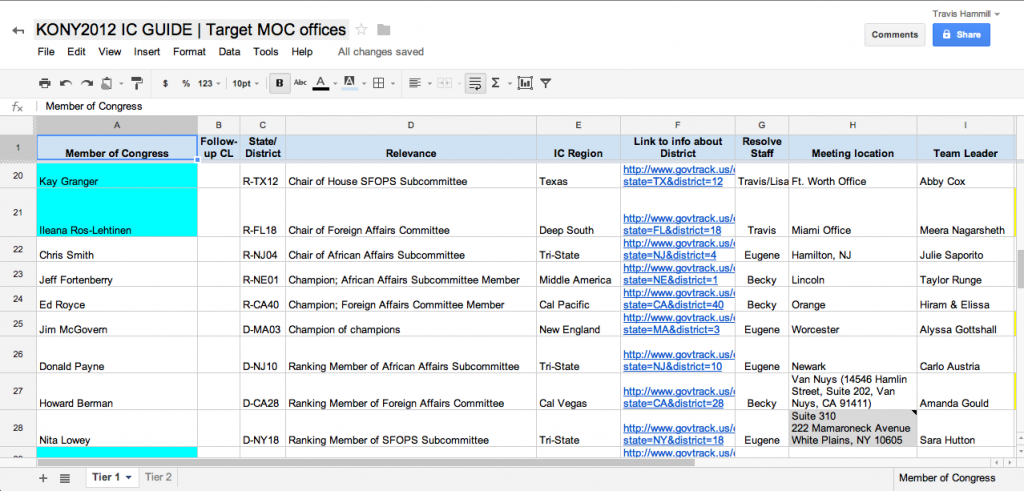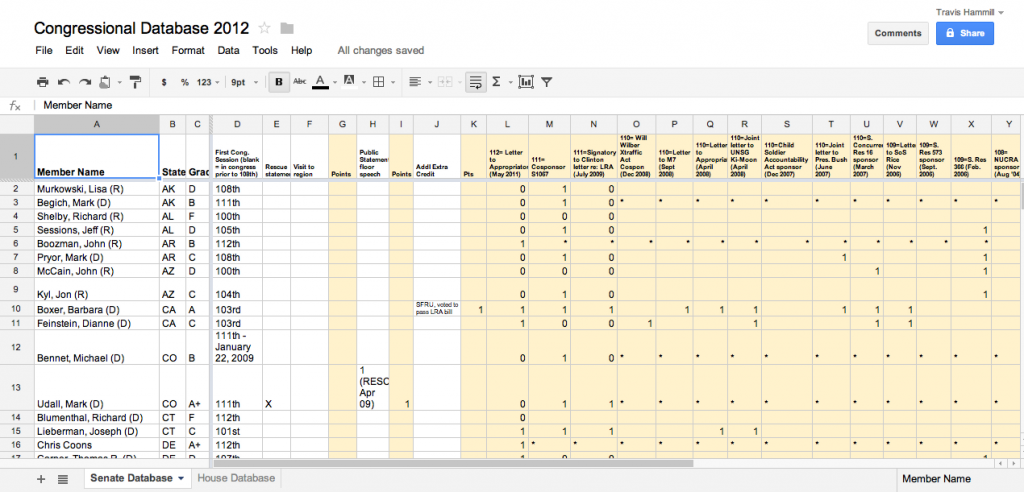October 16, 2012 • No Comments
I’ve used a lot of what Google Docs has to offer, especially with my job this past year working on a human rights campaign. What I love about Google Docs is that the interface is very user friendly and anytime I want to upload from Excel or Numbers to Google Docs, or download from Google Docs to Excel or Numbers, it is near seamless. All my formatting stays the same, none of the data is screwed up, and I’m able to share it easily among those working in the same department.
This was extremely important for the job that I had, where many of the people I was working with were in San Diego, Gulu Uganda, DRo Congo, and Seattle, while I was in Washington DC. What amazed me about Google Docs is that I could be on a conference call with people from all of these places over Google Voice, editing our spreadsheets, databases, and presentations in real time, and being able to effectively work quickly and simply without having all sorts of trouble.
Just to show my proficiency with Google Docs and Charts, I have a few images below that show the work I was doing.


Category: Readings Tagged: Effeciency, Excel, Google Docs, Google Drive, Numbers, Spreadsheets
October 15, 2012 • No Comments
I decided to give the map-making tools a try. One thing that had been pointed out by my professor was that I didn’t show a lot of care for privacy in regards to the things I put on the map. The reason I chose these locations on my map versus making something different is that all of these locations, related to me, are accesible online from other services. My address is in the white pages, my place of work is included in multiple articles, events, and sites related to my work, my school is stated on my facebook page and the GMU honor role list that is online. These things are all accessible without anyone having to look to far.
So that’s why I chose these places!
View Untitled in a larger map
Category: Readings
October 14, 2012 • No Comments
Mat Honan’s article about his entire digital life being wiped out by hackers is certainly a scary example of how our personal information is accessible by anyone with an internet connection and a small bit of computer knowledge. This is certainly disconcerting, especially thinking how much important information we have on separate websites all across the internet. Personally, I have multiple social networking accounts, remote access to my functions for my job, music sites, video sharing, banking, blogging, shopping, and other functions, all for my personal use. Keeping track of everything like that can be tough. But I think this article made me want to make sure I am still following strong security practices.
Give yourself 1 point for every “no” answer to the following 5 questions.
- Do you use the same password for any of these accounts: Email, Google/Gmail, Facebook, iTunes/Apple, Amazon, online banking? 1
- Is your email password less than 10 characters long? 0
- Have you ever told anyone else one of your passwords? 1
- Do you allow your web browser, your email client, or any websites to save passwords? 1
- Do you have any passwords written down somewhere? 1
Give yourself 1 point for every “yes” answer to the following 5 questions.
- Do you back up your data? 1
- Do you have data backups both “in the cloud” (online) and locally (on another hard drive or computer)? 1
- Is your primary computer password-protected? 1
- Is your anti-virus software up to date? 1
- Do you regularly update your operating system? 1
I scored a 9/10 on the security questions. Which is good, but Mat Honan’s article brought up something I didn’t think about. His accounts were hacked because he had all of his online applications linked to one another, and I think I am going to go ahead and change all of that.
Category: Readings Tagged: History 390, Mat Honan, Online Security, readings, Wired
October 14, 2012 • No Comments
We were asked to determine the ethics and legality of a website pertaining to our topic for our final project. I am researching the use of foreign aid in developing countries and how, historically, foreign aid has been detrimental to the development of these nations. I have many resources that come from news articles, case studies, and field reports that are included in scholarly journals and well respected news sites. However, I am also looking at current use of foreign aid as a comparison to what the international community has used in the past. One of the resources I have chosen to use is a website from the research and lobbying group, Resolve Inc. This non-profit group researches issues surrounding the LRA and Joseph Kony in Uganda, DRo Congo, and Central African Republic.
The reason I have chosen Resolve’s website for this activity is because they have detailed policy reports that factor in all sorts of historical facts and current issues, as well as recommendations for future work done on an international scale by the US in regards to ending the LRA crisis. *DISCLAIMER* The opinions in this post are mine and only mine, and do not represent the organization Resolve, its affiliates, or anything related to their work. I do not work for the organization, and I am expressing these views for a class, so all information I post should be taken with a grain of salt. **
The policy reports found on Resolve’s site are useful for what I will be doing, as they cite reports from other organizations, information from field researchers both employed by Resolve and unaffiliated reporters, on the ground research both in the region and with the US Government. They also include facts and figures that show trends of foreign aid use from the UN, the US, and other parties.
Ethically, they are mostly unbiased. They focus on the issue that there is a man named Joseph Kony who is the leader of the LRA (a rebel group with no cause that abducts children to continue their reign of terror in rural areas of eastern Africa) and they push for his arrest and trial by the International Criminal Court. They are their own organization and are not a front for other groups in the US. They also make a point of reaching beyond political lines when working with Congress. They do not however push for the arrest of leaders like Paul Kagame and Yoweri Museveni, who are presidents of Rwanda and Uganda respectively, who are also guilty of war crimes and elections fraud, as well as allowing the LRA issue to perpetuate. This is not the mission of Resolve, however, as they are pushing for an end to the LRA, so ethically, Resolve should be well respected and received.
There are no legal issues that I see arising from the organization’s website as they either produce their own reports with their own photos and text, or they use publicly available media and cite any and all reports that are used in their own publications. They even cite their editors for their reports and I take this as a move of good faith.
This will be a valuable resource for this project as there is a lot of good information and links to other great sources. Plus, ethically and legally, this resource will be well respected.
Category: Readings ,Research Project Tagged: Ethics, History 390, ICC, International Criminal Court, Joseph Kony, Legality, LRA, Resolve Inc
September 23, 2012 • No Comments
I will start this post with a disclaimer. I am opposed to record companies as a whole. Granted, many smaller ones are responsible, and many career musicians owe their lifestyles and successes to these types of companies. However, in the grand scheme of things, record companies homogenize digestible sound to “shut-up-and-take-my-money” consumers without a second thought to artistry. It’s all about the big bucks.
From the above disclaimer, one could probably gather that I am all for torrent sites, file-sharing, and the like. I do appreciate the fact that I have access to millions of songs that I could otherwise not have found without being required to buy used or rare vinyl records and equipment to hear. I’m also able to get special foreign releases from my favorite bands not available in the US.
Yet I do understand that a musician has to be able to continue creating the artistry. That’s what touring is for. Case in point: the independent band Dispatch. Three college friends from Vermont put the music they had recorded on their own, in their basement, on equipment they had purchased, up on Napster, the file sharing site, and within 8 years, they sold out Madison Square Gardens 3 consecutive nights.
I see the music that a band or a musician creates as their way of advertising. Getting people to like your music, creating buzz, and then performing would create an income (and weed out crap like Nicki Minaj).
Copyright, it seems to me, is really just a way for record companies to make money (artists only receive about 9 percent of the money made from album sales) and they operate as a middle man that doesn’t really need to exist in the digital age.
Category: Readings Tagged: Copyright, Dispatch, File Sharing, Music, Napster, Record Companies


